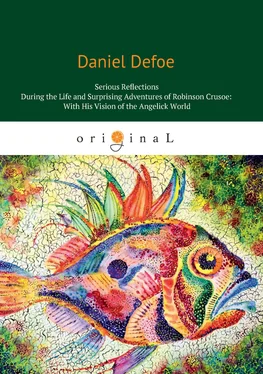There is a kind of murder that may be committed with the tongue, that is in its nature as cruel as that of the hand. This can never be the practice of an honest man; nay, he that practises it cannot be an honest man.
But perhaps I may come to this again, but I must go back to explain myself upon the subject a little farther in the general, and then you shall hear more of me as to the particulars.
Of Honesty in General
I have always observed, that however few the real honest men are, yet every man thinks himself and proclaims himself an honest man. Honesty, like heaven, has all men’s good word, and all men pretend to a share of it; so general is the claim, that like a jest which is spoiled by the repetition, ‘tis grown of no value for a man to swear by his faith, which is, in its original meaning, by his honesty, and ought to be understood so.
Like heaven, too, ‘tis little understood by those who pretend most to it; ‘tis too often squared according to men’s private interest, though at the same time the latitude which some men give themselves is inconsistent with its nature.
Honesty is a general probity of mind, an aptitude to act justly and honourably in all cases, religious and civil, and to all persons, superior or inferior; neither is ability or disability to act so any part of the thing itself in this sense.
It may be distinguished into justice and equity, or, if you will, into debt and honour, for both make up but one honesty.
Exact justice is a debt to all our fellow-creatures; and honourable, generous justice is derived from that golden rule, Quod tibi fieri non vis alteri ne feceris; and all this put together, makes up honesty; honour, indeed, is a higher word for it, but ‘tis the same thing, and
Differs from justice only in the name,
For honesty and honour are the same.
This honesty is of so qualifying a nature, that ‘tis the most denominative of all possible virtues; an honest man is the best title can be given in the world; all other titles are empty and ridiculous without it, and no title can be really scandalous if this remain. Tis the capital letter, by which a man’s character will be known, when private qualities and accomplishments are worm-eaten by time; without it a man can neither be a Christian or a gentleman. A man may be a poor honest man, an unfortunate honest man; but a Christian knave, or a gentleman knave, is a contradiction. A man forfeits his character and his family by knavery, and his escutcheon ought to have a particular blot, like that of bastardy. When a gentleman loses his honesty, he ceases to be a gentleman, commences rake from that minute, and ought to be used like one.
Honesty has such a general character in the minds of men, that the worst of men, who neither practise or pretend to any part of it, will yet value it in others; no man ever could be so out of love with it as to desire his posterity should be without it; nay, such is the veneration all men have for it, that the general blessing of a father to his son is, “ Pray God make thee an honest man.”
Indeed, so general is the value of it, and so well known, that it seems needless to say anything in behalf of it. So far as it is found upon earth, so much of the first rectitude of nature and of the image of God seems to be restored to mankind.
The greatest mischief which to me seems to attend this virtue, like the thorn about the rose, which pricks the finger of those who meddle with it, is pride; ‘tis a hard thing for a man to be very honest, and not be proud of it; and though he who is really honest has, as we say, something to be proud of, yet I take this honesty to be in a great deal of danger who values himself too much upon it.
True honest honesty, if I may be allowed such an expression, has the least relation to pride of any view in the world; ‘tis all simple, plain, genuine, and sincere; and if I hear a man boast of his honesty, I cannot help having some fears for him, at least, that ‘tis sickly and languishing.
Honesty is a little tender plant, not known to all who have skill in simples, thick sowed, as they say, and thin come up; ‘tis nice of growth, it seldom thrives in a very fat soil, and yet a very poor ground, too, is apt to starve it, unless it has taken very good root. When it once takes to a piece of ground, it will never be quite destroyed; it may be choked with the weeds of prosperity, and sometimes ‘tis so scorched up with the droughts of poverty and necessity, that it seems as if it were quite dead and gone; but it always revives upon the least mild weather, and if some showers of plenty fall, it makes full reparation for the loss the gardener had in his crop.
There is an ugly weed, called cunning, which is very pernicious to it, and which particularly injures it, by hiding it from our discovery, and making it hard to find. This is so like honesty, that many a man has been deceived with it, and has taken one for t’ other in the market; nay, I have heard of some who have planted this wild honesty, as we may call it, in their own ground, have made use of it in their friendships and dealings, and thought it had been the true plant, but they always lost credit by it. And that was not the worst neither, for they had the loss who dealt with them, and who chaffered for a counterfeit commodity; and we find many deceived so still, which is the occasion there is such an outcry about false friends, and about sharping and tricking in men’s ordinary dealings in the world.
This true honesty, too, has some little difference in it, according to the soil or climate in which it grows, and your simplers have had some disputes about the sorts of it; nay, there have been great heats about the several kinds of this plant, which grows in different countries, and some call that honesty which others say is not; as, particularly, they say, there is a sort of honesty in my country, Yorkshire honesty, which differs very much from that which is found in these southern parts about London; then there is a sort of Scots honesty, which they say is a meaner sort than that of Yorkshire; and in New England I have heard they have a kind of honesty which is worse than the Scottish, and little better than the wild honesty called cunning, which I mentioned before. On the other hand, they tell us that in some parts of Asia, at Smyrna, and at Constantinople, the Turks have a better sort of honesty than any of us. I am sorry our Turkey Company have not imported some of it, that we might try whether it would thrive here or no. ‘Tis a little odd to me it should grow to such a perfection in Turkey, because it has always been observed to thrive best where it is sowed with a sort of grain called religion; indeed, they never thrive in these parts of the world so well apart as they do together. And for this reason, I must own, I have found that Scots honesty, as above, to be of a very good kind.
How it is in Turkey I know not, for, in all my travels, I never set my foot in the Grand Seignior’s dominions.
But to waive allegories; disputes about what is or is not honesty are dangerous to honesty itself, for no case can be doubtful which does not border upon the frontiers of dishonesty; and he that resolves not to be drowned had best never come near the brink of the water.
That man who will do nothing but what is barely honest, is in great danger. It is certainly just for me to do everything the law justifies, but if I should only square my actions by what is literally lawful, I must throw every debtor, though he be poor, in prison, and never release him till he has paid the uttermost farthing; I must hang every malefactor without mercy; I must exact the penalty of every bond, and the forfeiture of every indenture. In short, I must be uneasy to all mankind, and make them so to me; and in a word, be a very knave too, as well as a tyrant, for cruelty is not honesty.
Читать дальше











